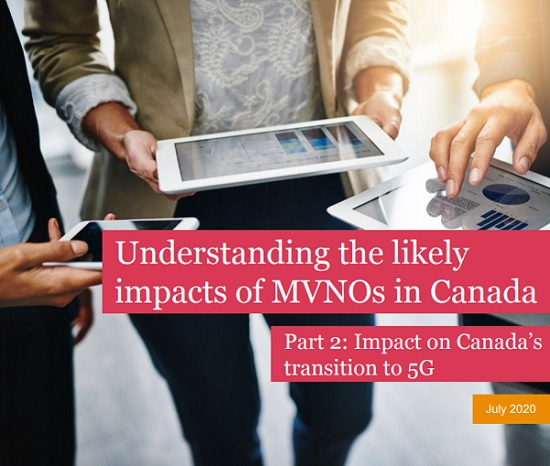
OTTAWA — If the CRTC decides to mandate mobile virtual network operator (MVNO) access to incumbent wireless carriers’ networks, the deployment of 5G in Canada is likely to be deferred and curtailed, according to PricewaterhouseCoopers in the second part of a study released today by the Canadian Wireless Telecommunications Association (CWTA).
Following up on its previous report looking at the impact of mandated MVNOs on Canada’s telecom industry and economy, the second part of PwC’s study explores how wholesale MVNO access could impact Canada’s transition to 5G. The two-part study was commissioned by members of the CWTA. The study is based on information sourced from OECD, Recon Analytics, Government of Canada, CWTA, CTIA, Statistics Canada, Capital IQ and GSMA, among other sources.
PwC’s approach in part two of the study comprised three steps:
- Examining how regulations mandating wholesale MVNO access slowed network adoption during the 3G-to-4G transitions across a set of peer countries focused on Europe;
- Applying the learnings from global case studies, combined with PwC’s own analysis, to estimate how the transition to 5G in Canada over the next decade would be impacted by the introduction of MVNO regulation; and
- Estimating the economic opportunity cost, in terms of lost gross domestic product (GDP), associated with deferred 5G network adoption in Canada over the next decade.
According to its analysis, PwC says enforced MVNO access (where resellers lease space on incumbents’ networks) could lower the financial ability and incentive of mobile network operators (MNOs) to make the substantial investment required to build 5G networks, which could lead to deferred and curtailed 5G rollout across Canada.
“We estimate that effective 5G coverage — the share of population that receives 5G coverage with sufficient quality to realize economically beneficial use cases — would by 2030 be reduced from 95% with no regulation to 75% with regulation,” reads the report.
As a result, with limited ability to realize important use cases, such as smart factories, Canada could forgo many of the socioeconomic benefits expected to be derived from 5G over the next decade, PwC says in its report.
That said, 5G is barely out of the starting gate and most use cases are still on the drawing board. Those companies hoping for an MVNO mandate already stated their opposing point of view with the release of part one of the PwC report.
The main risk to Canada’s 5G transition, says PwC, is mandating wholesale MVNO access could lead to significant declines in the wireless industry’s average revenue per user (ARPU). The first part of the study evaluated a scenario where regulation to mandate MVNO access led to a 30-35% decrease in ARPU and a 6-8% market-share decline for MNOs.
“In this scenario, existing MNOs could see revenue declines of 16% across all lines of business and, in response, cut operating and capital expenditures by $5B and $3B, respectively, to manage declines in EBITDA and free cash flow,” says the report. “As a result, the incentive for MNOs to invest in 5G deployment may decrease, resulting in a smaller portion of the population receiving coverage.”
The resulting impact of mandating MVNOs would likely widen the digital divide between urban and rural Canadians, the report adds.
To access a copy of part two of the PwC study, please click here.



